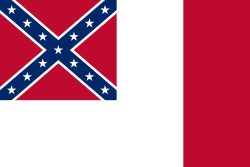O I'm a good old rebel,
Now that's just what I am.
For this "fair land of freedom"
I do not care a damn.
I'm glad I fought against it,
I only wish we'd won,
And I don't want no pardon
For anything I done.
I hates the Constitution,
This great republic too,
I hates the Freedmans' Buro,
In uniforms of blue.
I hates the nasty eagle,
With all his braggs and fuss,
The lyin' thievin' Yankees,
I hates 'em wuss and wuss.
I hates the Yankees nation
And everything they do,
I hates the Declaration,
Of Independence, too.
I hates the glorious Union-
'Tis dripping with our blood-
I hates their striped banner,
I fought it all I could
I rode with Robert E. Lee,
For three year near about,
Got wounded in four places
And starved at Point Lookout
I caught the rheumatism
A' campin' in the snow,
But I killed a chance o' Yankees
I'd like to kill some mo'.
Three hundred thousand Yankees
Is stiff in Southern dust,
We got three hundred thousand
Before they conquered us.
They died of Southern fever
And Southern steel and shot,
I wish they was three million
Instead of what we got.
I can't take up my musket
And fight 'em now no more,
But I ain't going to love 'em,
Now that is sarten sure,
And I don't want no pardon
For what I was and am.
I won't be reconstructed,
And I don't care a damn.
